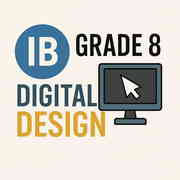Professional Courses
Industry-relevant training in Business, Technology, and Design
Categories
Interactive Games
Fun games to boost memory, math, typing, and English skills
Typing
Memory
Math
English Adventures
Knowledge

IB 8 Design (Digital Design)
Evaluation serves as a critical phase in the design cycle that assesses the effectiveness, efficiency, and user satisfaction of a product against its original specifications. The chapter outlines detailed methodologies for developing usability test plans, conducting structured sessions, gathering feedback, and analyzing data to formulate actionable recommendations. Additionally, it emphasizes the importance of reflective writing and compiling comprehensive evaluation reports for ongoing improvement in design practices.
4 Chapters
40 hr
We're sorry, but this course is currently unavailable. It may have expired, be pending
approval, or still be processing
your enrollment. Please check back later or contact your instructor or support for
assistance.
